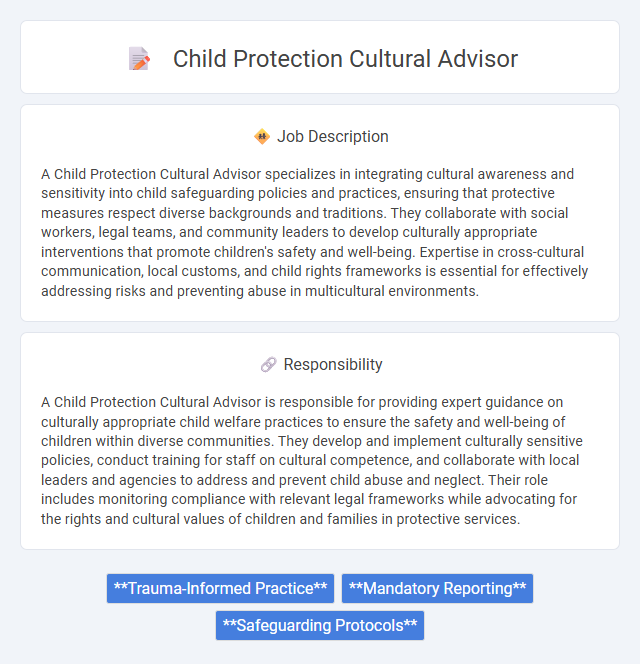
A Child Protection Cultural Advisor specializes in integrating cultural awareness and sensitivity into child safeguarding policies and practices, ensuring that protective measures respect diverse backgrounds and traditions. They collaborate with social workers, legal teams, and community leaders to develop culturally appropriate interventions that promote children's safety and well-being. Expertise in cross-cultural communication, local customs, and child rights frameworks is essential for effectively addressing risks and preventing abuse in multicultural environments.
Individuals with a strong background in cultural diversity and child welfare are likely suitable for a Child Protection Cultural Advisor role. Candidates who demonstrate empathy, cultural sensitivity, and effective communication skills may be better equipped to navigate complex family dynamics and advocate for children's rights. Those lacking experience in cross-cultural environments or child protection frameworks might face challenges adapting to the nuanced responsibilities of this position.
Qualification
A Child Protection Cultural Advisor requires specialized qualifications including a background in social work, psychology, or anthropology with a focus on child welfare and cultural competency. Proficiency in local languages and cultural customs enhances effective communication and trust-building within diverse communities. Extensive experience in cross-cultural settings and knowledge of child protection laws and frameworks are essential to ensure culturally sensitive and compliant interventions.
Responsibility
A Child Protection Cultural Advisor is responsible for providing expert guidance on culturally appropriate child welfare practices to ensure the safety and well-being of children within diverse communities. They develop and implement culturally sensitive policies, conduct training for staff on cultural competence, and collaborate with local leaders and agencies to address and prevent child abuse and neglect. Their role includes monitoring compliance with relevant legal frameworks while advocating for the rights and cultural values of children and families in protective services.
Benefit
Working as a Child Protection Cultural Advisor likely improves the effectiveness of safeguarding strategies by incorporating cultural understanding into child welfare practices. This role probably enhances communication between service providers and diverse communities, reducing misunderstandings and increasing trust. Employing such advisors may result in more culturally sensitive interventions, ultimately promoting better outcomes for children at risk.
Challenge
The role of a Child Protection Cultural Advisor likely involves navigating complex cultural norms and practices to effectively safeguard children in diverse communities. Challenges probably include balancing respect for cultural traditions with adherence to child protection laws and policies while fostering trust among local stakeholders. There is a significant probability that the advisor must address potential resistance to change and overcome communication barriers to ensure children's safety.
Career Advancement
A Child Protection Cultural Advisor plays a critical role in ensuring culturally sensitive approaches within child welfare programs, enhancing the effectiveness of interventions and policies. Expertise in this field opens pathways to leadership roles in international NGOs, government agencies, and community organizations, where advanced skills in cultural competency and child protection frameworks are highly sought after. Continuous professional development and networking within multidisciplinary teams significantly boost career progression opportunities in this specialized area.
Key Terms
Trauma-Informed Practice
A Child Protection Cultural Advisor specializing in Trauma-Informed Practice provides expert guidance on integrating cultural sensitivity into trauma-aware interventions, ensuring child welfare strategies respect diverse backgrounds. This role involves collaboration with social workers to develop policies that address the impact of trauma within different cultural contexts, enhancing the effectiveness of protective measures. Expertise in historical trauma and cultural healing practices is vital for creating supportive environments that foster resilience and recovery among vulnerable children.
Mandatory Reporting
A Child Protection Cultural Advisor plays a critical role in ensuring compliance with mandatory reporting laws by guiding organizations on culturally sensitive practices that respect diverse backgrounds while safeguarding children's well-being. This position requires expertise in interpreting legal obligations and local child protection policies to foster environments where signs of abuse or neglect are promptly identified and reported according to statutory requirements. Effective communication with community members and stakeholders ensures that mandatory reporting processes uphold cultural understanding, trust, and child safety.
Safeguarding Protocols
A Child Protection Cultural Advisor ensures the implementation of safeguarding protocols that respect cultural sensitivities and legal standards to protect children from abuse and exploitation. They develop and monitor culturally appropriate guidelines, conduct training for staff on recognizing and responding to child protection issues, and collaborate with community leaders to reinforce safe environments. Expertise in cross-cultural communication and local child protection laws is essential for adapting safeguarding measures effectively.
 kuljobs.com
kuljobs.com